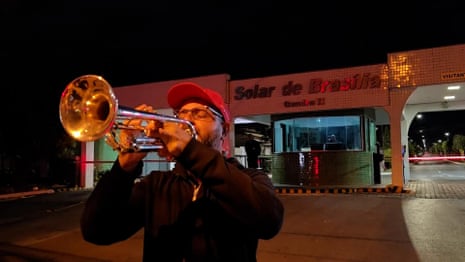When Jair Bolsonaro was Brazil’s far-right president, the guerrilla trumpeter Fabiano Leitão would stalk him around the capital, Brasília, to taunt him with renditions of the anti-fascist anthem Bella Ciao.
In March, when Bolsonaro was charged with plotting a coup, Leitão changed his tune and began provoking the ex-president by serenading him with Chopin’s Funeral March. “It symbolises his political demise, which is what we want to see,” said the 46-year-old musician.
Now, as the supreme court prepares to decide whether to send Bolsonaro to jail for that alleged power grab, Leitão is cooking up another performance to commemorate the populist’s downfall and disgrace. “It’ll be something happy! It has to be something happy!” enthused the trumpeter, crooning one of the upbeat samba classics he was considering to mark the occasion.

Fabiano Leitão performs excerpt from Chopin’s Funeral March outside Bolsonaro’s home – video
“Cry! I won’t care!” smirk the lyrics of Vou Festejar. “I’m going to celebrate your suffering [and] your grief!”
Leitão is among millions of progressive Brazilians who have the metaphorical champagne on ice ahead of the widely anticipated conviction of Bolsonaro and seven alleged co-conspirators when their judgment begins this week.
Seven years after the former paratrooper swept to power on a wave of social media-fuelled anti-establishment voter rage, and three after voters removed him from office, Bolsonaro is careering towards the lowest point of his 35-year political career.
On Tuesday, five supreme court judges will convene in Brasília to rule on whether Bolsonaro is guilty of masterminding a failed coup after losing the 2022 election to his leftwing opponent, Luiz Inácio Lula da Silva – and, if so, how long he should spend in jail.
Legal experts believe Bolsonaro’s conviction is all but guaranteed during a judgment expected to last five sessions, between 2 September and 12 September. His sentence could reach 43 years, meaning the 70-year-old grandfather could spend the rest of his life behind bars. Bolsonaro stands accused of five crimes including involvement in an armed criminal organisation, coup d’état and violently attempting to abolish Brazilian democracy.
Prosecutors have claimed one part of the sprawling conspiracy, codenamed Operation Green and Yellow Dagger, included plans to sow chaos – and justify a military intervention – by murdering Lula, his vice-president, Geraldo Alckmin, and Alexandre de Moraes, a supreme court judge, who is now overseeing Bolsonaro’s trial.
Federal police investigators allege the pro-Bolsonaro coup only failed because the heads of the army and air force, Gen Marco Antônio Freire Gomes and Brig Gen Carlos de Almeida Baptista Júnior, refused to take part. The navy commander Adm Almir Garnier Santos, who is one of the seven alleged accomplices also standing trial, has been accused of offering his support, charges he denies.
“The [prosecution’s] closing arguments are really hard-hitting – there’s so much evidence … It’s really hard to imagine an acquittal,” Eloísa Machado, a constitutional law expert from the Getulio Vargas Foundation law school, said of Bolsonaro.
Such predictions are music to the ears of Leitão, the activist trumpeter, who hopes judges will throw the book at a politician he blames for trying to wreck Brazilian democracy and destroying Brazilian lives. During Bolsonaro’s 2019-2022 presidency, hundreds of thousands of Brazilians were killed by a Covid pandemic that the ex-president was accused of mishandling with his anti-scientific response and sluggish purchase of vaccines.
“It’s going to be a moment of joy to see the country free itself of this instrument of destruction,” said Leitão, whom fans call the “Trompetista” – a play on the words “trumpeter” and “petista”, as members of Lula’s Worker’s party (PT) are known. “We always complain about our democracy and how fragile it is. But we’re doing much better than the United States, which never arrested Trump.”
In the run-up to this week’s judgment, Donald Trump, who is Bolsonaro’s most powerful foreign friend, has waded into the courtroom drama, imposing sanctions on Moraes, the justice leading the trial, and 50% tariffs on Brazilian imports in protest at the supposed “witch-hunt” against his ally. “It’s really a political execution that they’re trying to do with Bolsonaro,” Trump declared recently.
Bolsonaro’s third son, the congressman Eduardo Bolsonaro, has relocated to the US and busied himself lobbying Trump officials to target Brazil’s top tribunal and Lula allies such as the health minister, whose wife and daughter were stripped of their US visas. “Trump is our only way out,” the president of Bolsonaro’s Liberal party, Valdemar Costa Neto, recently told reporters.
Analysts believe the US coercion campaign will fail to sway the judges who will decide Bolsonaro’s fate. In a rare interview on the eve of the judgment, Moraes vowed to shrug off US pressure. “There isn’t the smallest of possibilities of retreating even one millimetre,” he told the Washington Post. “We’ll do what’s right: we’ll receive the accusation, analyse the evidence, and who should be convicted shall be convicted, and who should be absolved shall be absolved.”
Bolsonaro, who was placed under house arrest in early August after violating a court order banning him from using social media, denies engineering a coup. He has admitted considering “alternative” ways of retaining power after his election defeat. The ex-president continues to insist he will challenge Lula for the presidency in next year’s election, although the supreme court has already barred him from seeking office until 2030 for spreading disinformation.
After hearing that Bolsonaro had been confined to his mansion a short drive from the presidential palace he once occupied, Leitão grabbed his trumpet and rushed to the scene.
As night fell, the musician raised his instrument to his lips outside the gates of Bolsonaro’s home and played an unusually cheery excerpt from Chopin’s Piano Sonata No 2 into the night.
“The message is that it’s over,” the guerrilla trumpeter said after his work was done. “I’m holding his political wake – and the burial is imminent.”
